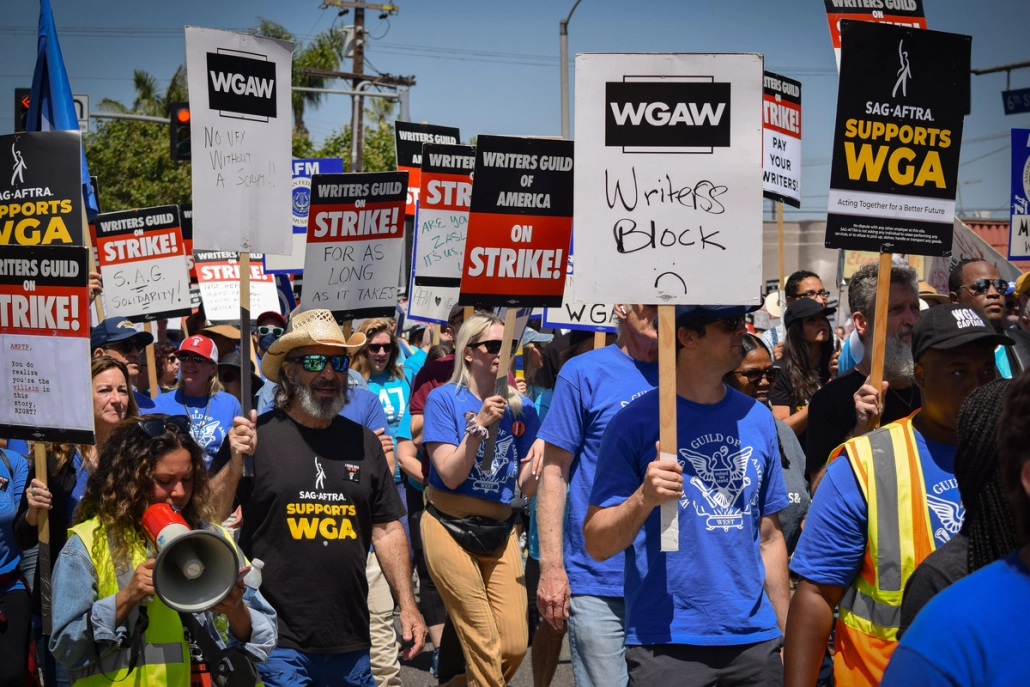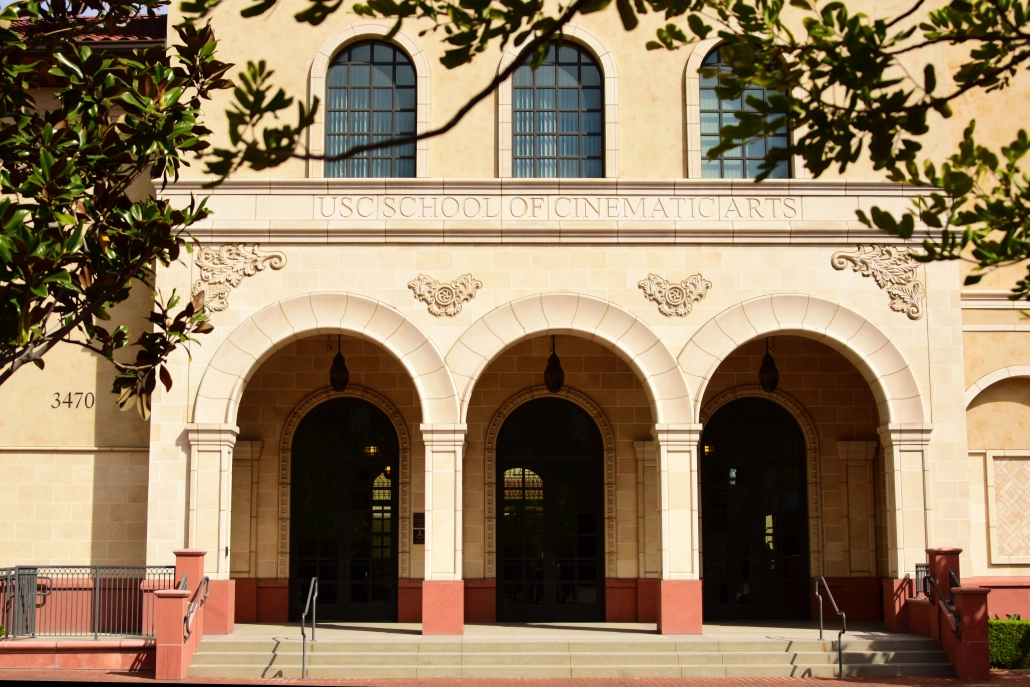Students, faculty breathe sigh of relief as writers’ strike ends
The deal addresses the size of writers’ rooms, residuals and AI usage in scripts.
The deal addresses the size of writers’ rooms, residuals and AI usage in scripts.

The Writers Guild of America’s 148-day strike was declared over after the WGA reached a tentative deal with the Alliance of Motion Picture and Television Producers Sept. 27. Guild members still need to vote on ratifying the contract, a process that will take place between Oct. 2 and Oct. 9.
Anita Dashiell-Sparks, a professor of theatre practice in acting and Screen Actors Guild-American Federation of Television and Radio Artists member, said the strike was important because the time and energy put into creative work needs to be valued and honored.
“Being creatives and being artists … is really at a crossroads in terms of a viable career, where people can live upon the earnings from their creative work and their creative labor,” Dashiell-Sparks said. “That honestly has been what has been at stake.”
Colton Casella, a senior majoring in writing for screen and television, said he was concerned when the strike was announced because he wasn’t sure if the industry he was entering would support him and his peers.
“If this is going to be our career, how viable will that be towards making a living?” Casella said. “And then if we wanted to continue to create or even to do what the faculty have done and come back and teach it? Is that still going to be a path? Is that going to be the only path to make money, academia?”
David Isaacs — a professor of screen and television writing, the chair of the John Wells Division of Writing for Screen & Television and a WGA member — felt much more confident in the negotiations, assuming they had gotten a foothold on the major issues. He felt that the three biggest issues were revenue from streaming, extending the contracts of writers and regulation for the use of artificial intelligence.
“When I saw the first initial email from the guild to its members, they said it was, if I’m not mistaken, exceptional,” Isaacs said. “To use that adjective was pretty stunning. Because they don’t say that unless you really got an exceptional deal, so I was very excited when I saw that.”
Once the details of the deal were released to the members of the guild, he realized the deal went beyond what he thought they would get. The deal includes a minimum size for writers’ rooms, improved residuals and the guild has the ultimate decision on whether or not to use AI. Though Isaacs was unable to attend the WGA meeting Sept. 27, he heard that the negotiation team got a 10-minute standing ovation.
“These are writers; they’re not always easy to please,” Isaacs said. “If a writer gives you a standing ovation, that’s the highest form of flattery there could possibly be.”
When it comes time to vote, Isaacs plans to vote to ratify the deal.

When Casella saw the deal, he felt it answered his question of job security. He said he is also excited to see whether the deal will create a more creative-focused industry or if it’ll encourage the same style of content but with more writer-focused provisions.
Chris Allport, a graduate student studying writing for screen and television, was similarly grateful that the strike had been successful and that he was entering Hollywood supported by the new measures.
“I feel very lucky to be entering into an industry now that has far more built-in protections and makes the livelihood of being a professional screenwriter more sustainable,” he said.
Though the WGA strike is over, the SAG-AFTRA strike is still ongoing. SAG-AFTRA, the screen actors guild, has been on strike since July 14, hoping to receive more residuals from streaming and protections against AI. SAG-AFTRA will likely use the details of the WGA deal to strategize and strengthen their own argument, Dashiell-Sparks said. As well as fair and equitable pay, SAG-AFTRA is trying to protect the rights, likeness and voice of actors in relation to AI technology.
“Those negotiating points that are a part of the WGA agreement will serve as foundational, leveraging negotiating points,” Dashiell-Sparks said. “It’s a major turning point and leveraging point for the SAG-AFTRA members.”
The strike has allowed the general public to take a peek behind the Hollywood curtain and see how creatives are treated and how their creative property isn’t valued, Dashiell-Sparks said.
“Those deal points have not been drafted with the creative’s best interest in mind,” she said. “It actually has been the executives. And so this moment has really lifted the veil on those kinds of inequities and disparities that actually have been going on.”
Isaacs hopes that the WGA strike will serve as a catalyst for unions to receive equal pay for their work, and wants others to see the WGA make large corporations bend to their wishes and give writers what they deserve.
Angie Antoine, a graduate student studying writing for screen and television, plans on continuing to picket for SAG-AFTRA if a deal isn’t reached.
“I just hope there’s going to be a ripple effect throughout not just the entertainment industry but in industries across America,” she said. “These corporations need to be reminded that people are at the heart of everything they do.”
We are the only independent newspaper here at USC, run at every level by students. That means we aren’t tied down by any other interests but those of readers like you: the students, faculty, staff and South Central residents that together make up the USC community.
Independence is a double-edged sword: We have a unique lens into the University’s actions and policies, and can hold powerful figures accountable when others cannot. But that also means our budget is severely limited. We’re already spread thin as we compensate the writers, photographers, artists, designers and editors whose incredible work you see in our daily paper; as we work to revamp and expand our digital presence, we now have additional staff making podcasts, videos, webpages, our first ever magazine and social media content, who are at risk of being unable to receive the compensation they deserve.
We are therefore indebted to readers like you, who, by supporting us, help keep our paper daily (we are the only remaining college paper on the West Coast that prints every single weekday), independent, free and widely accessible.
Please consider supporting us. Even $1 goes a long way in supporting our work; if you are able, you can also support us with monthly, or even annual, donations. Thank you.
This site uses cookies. By continuing to browse the site, you are agreeing to our use of cookies.
Accept settingsDo Not AcceptWe may request cookies to be set on your device. We use cookies to let us know when you visit our websites, how you interact with us, to enrich your user experience, and to customize your relationship with our website.
Click on the different category headings to find out more. You can also change some of your preferences. Note that blocking some types of cookies may impact your experience on our websites and the services we are able to offer.
These cookies are strictly necessary to provide you with services available through our website and to use some of its features.
Because these cookies are strictly necessary to deliver the website, refusing them will have impact how our site functions. You always can block or delete cookies by changing your browser settings and force blocking all cookies on this website. But this will always prompt you to accept/refuse cookies when revisiting our site.
We fully respect if you want to refuse cookies but to avoid asking you again and again kindly allow us to store a cookie for that. You are free to opt out any time or opt in for other cookies to get a better experience. If you refuse cookies we will remove all set cookies in our domain.
We provide you with a list of stored cookies on your computer in our domain so you can check what we stored. Due to security reasons we are not able to show or modify cookies from other domains. You can check these in your browser security settings.
These cookies collect information that is used either in aggregate form to help us understand how our website is being used or how effective our marketing campaigns are, or to help us customize our website and application for you in order to enhance your experience.
If you do not want that we track your visit to our site you can disable tracking in your browser here:
We also use different external services like Google Webfonts, Google Maps, and external Video providers. Since these providers may collect personal data like your IP address we allow you to block them here. Please be aware that this might heavily reduce the functionality and appearance of our site. Changes will take effect once you reload the page.
Google Webfont Settings:
Google Map Settings:
Google reCaptcha Settings:
Vimeo and Youtube video embeds:
The following cookies are also needed - You can choose if you want to allow them:
